
The THC Ministry, founded by Roger Christie from the Religion of Jesus Church, is a religion which considers cannabis to be a sacrament. Members base their practices on what they see as an eclectic mixture of ancient wisdom, modern science, and the enlightening and healing properties of cannabis sacrament. Its mission includes "liberating the Cannabis plant and the minds of those who do and of those who do not revere it," and is actively involved in the legal and social discussions surrounding cannabis use in society. On July 8, 2010, Christie and 13 other individuals allegedly associated with the THC Ministry were indicted by a Federal grand jury in Honolulu on Marijuana Possession and Trafficking charges. Christie served four years in jail following an April 2014 sentencing, and was on probation until 2018.
Roger Christie is an American ordained minister in the Religion of Jesus Church, which regards marijuana as a "sacramental herb." In 2000, he founded the THC Ministry, which offered cannabis as a part of its services. On July 8, 2010, Christie and 13 other individuals associated with the THC Ministry were indicted by a Federal grand jury in Honolulu on marijuana possession and trafficking charges. On Sept. 27, 2013, Christie pleaded guilty to marijuana trafficking and two counts of failing to file income tax returns. On April 28, 2014, Christie was sentenced to a term of five years in federal prison, with credit for time already served at the Honolulu Federal Detention Center.
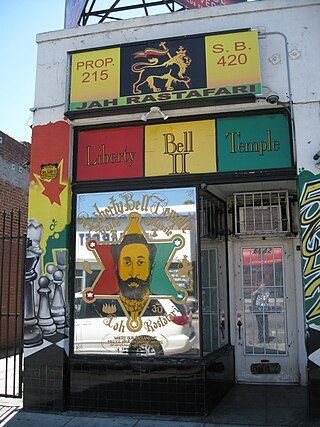
Different religions have varying stances on the use of cannabis, historically and presently. In ancient history some religions used cannabis as an entheogen, particularly in the Indian subcontinent where the tradition continues on a more limited basis.

Edwin George Perlmutter is an American lawyer and politician who served as the U.S. representative for Colorado's 7th congressional district from 2007 to 2023. A member of the Democratic Party, his district was located in the northern and western suburbs of the Denver metropolitan area. He previously served as the Colorado state senator from the 20th district from 1995 to 2003. On January 10, 2022, he announced he would not seek re-election in 2022.
Persecution of members of the Rastafari movement, an Abrahamic religion founded in Jamaica in the early 1930s among Afro-Jamaican communities, has been fairly continuous since the movement began but nowadays is particularly concerning their spiritual use of cannabis.
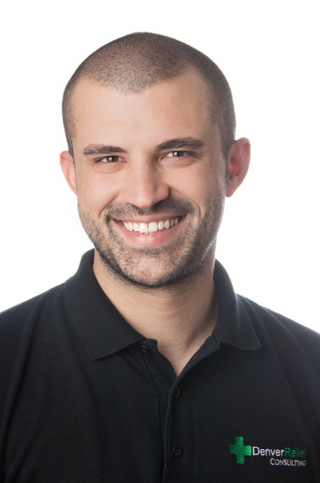
Kayvan Khalatbari is an Iranian-American entrepreneur; he was a mayoral candidate in Denver, Colorado, in 2019.
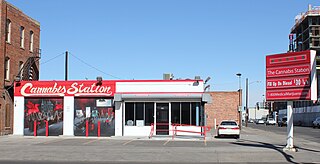
Cannabis dispensaries in the United States or marijuana dispensaries are a type of cannabis retail outlet, local government-regulated physical location, typically inside a retail storefront or office building, in which a person can purchase cannabis and cannabis-related items for medical or recreational use.

Ricardo Baca is an American journalist best known for being the first full-time marijuana rights editor for a major American newspaper. He was an editor at The Denver Post, producing The Cannabist for over three years until December, 2016. He is the "central character" of the 2015 documentary film Rolling Papers. He also shares his name with the first person to be convicted for the possession of marijuana after the Marijuana Tax Act of 1937 was put into action.
Leafbuyer Technologies, Inc. (Leafbuyer) is a marketing technology company for the cannabis industry and is an online cannabis resource. The primary function of the company's website is to serve as a coupon directory for cannabis patients and recreational users.

Terms related to cannabis include:
High Profits is an eight-part CNN documentary television series about Breckenridge Cannabis Club and the U.S. state of Colorado's legal cannabis industry. The series began airing on April 19, 2015.
House Resolution 1227, "Ending Federal Marijuana Prohibition Act of 2017", is a U.S. United States House resolution introduced during the 115th Congress. It would remove cannabis from the Controlled Substances Act Schedule I, and eliminate Federal restrictions on cannabis possession and sale, other than interstate transfers. It was initially sponsored by Thomas Garrett Jr., a Virginia Republican, and cosponsored by Scott Taylor, also a Virginia Republican, and Tulsi Gabbard, a Hawaii Democrat. It is reintroduced legislation from 2015, when it was known as S. 2237. Other Representatives who joined as cosponsors included Justin Amash, a Michigan Republican. On April 20, 2017, activists from D.C. Cannabis Campaign distributed 1,227 joints made from 1 pound (0.45 kg) of cannabis to members of congress to urge consideration of the bill.
Wanda L. James is the first African American woman to own a marijuana dispensary in the United States.
Cannabis product testing is a form of product testing analyzes the quality of cannabis extracts, edibles, and THC and CBD levels in an emergent consumer market eager to sell adult use products. Analytical chemistry and microbiology laboratories are important entities in consumer protection. These labs not only determine the condition and viability of cannabinoids, water content, heavy metals, pesticides, terpenes, yeast, but also the presence of mold, mycotoxins, and solvents. These laboratories emerged when advocates of cannabis testing raised concerns about potential contaminants.

Coachella Valley Church is a Rastafarian church of the Ethiopian Zion Coptic Church, located on The Alameda in San Jose, California. It was incorporated in 2016 and is at the same location as a previous dispensary, Amsterdam's Garden. The city has a history of litigation against its operators and seeks to end their operations, claiming it is an unpermitted marijuana dispensary.
Steve Ryan Berke is a co-founder of the International Church of Cannabis, two-time candidate for mayor of Miami Beach, cannabis activist, rapper, YouTuber, entrepreneur, and former All-American tennis player.

Cannabis concentrate, also called marijuana concentrate, marijuana extract, or cannabis extract, is a tetrahydrocannabinol (THC) and/or cannabidiol (CBD) concentrated mass. Cannabis concentrates contain high THC levels that range from 40% to over 90%, stronger in THC content than high-grade marijuana, which normally measures around 20% THC levels.
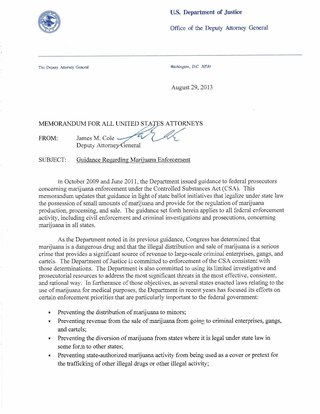
The Cole Memorandum was a United States Department of Justice memorandum issued August 29, 2013, by United States Deputy Attorney General James M. Cole during the presidency of Barack Obama. The memorandum, sent to all United States Attorneys, governed federal prosecution of offenses related to marijuana. The memo stated that given its limited resources, the Justice Department would not enforce federal marijuana prohibition in states that "enacted laws legalizing marijuana in some form and ... implemented strong and effective regulatory and enforcement systems to control the cultivation, distribution, sale, and possession of marijuana," except where a lack of federal enforcement would undermine federal priorities.
The cannabis industry in the U.S. state of Washington has been served by several banks and credit unions since Initiative 502 passed in 2012, legalizing production, distribution, retail sales and possession in the state.
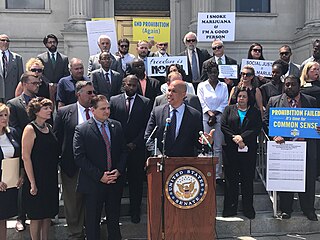
The Marijuana Justice Act (S.1689) was a 2017 bill to remove cannabis from the Controlled Substances Act, sponsored by U.S. Senator Cory Booker. An identical bill, H.R.4815, was introduced in the House of Representatives. The bill was reintroduced in 2019 and co-sponsored by a number of contenders for the Democratic Party's nomination for U.S. President in the 2020 election, including Kamala Harris, Elizabeth Warren, Kirsten Gillibrand, Michael Bennet, and Bernie Sanders. In February 2019, it was referred to the Committee on the Judiciary. The bill introduced by Senator Booker in the 2017–2018 Congress was called "among the most notable efforts" around legalization in that session. Besides removing cannabis from the Controlled Substances Act, the bill also sought to set up a community reinvestment fund, provide for expungement of past drug convictions, and penalize states that enforce cannabis laws disproportionately.











